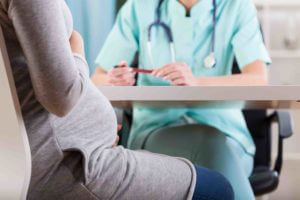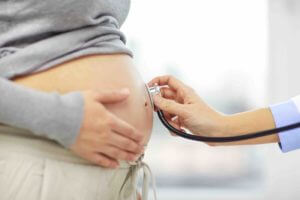An infection can cause discomfort for a few hours or even several days. If pregnant women are affected by gastrointestinal infections, they often wonder whether the disease can also harm their baby.
These and other questions on the subject of gastrointestinal infections in pregnancy are answered in the following article.
Table of contents
What Is A Gastrointestinal Infection?
An infection of the stomach and intestines is also known as gastroenteritis or stomach flu and is one of the most common infectious diseases. Almost everyone gets it at some point in their lives with what is known as vomiting diarrhea. Gastrointestinal infections are caused by viruses on the one hand, but also by bacteria on the other.
Noroviruses and rotaviruses are responsible for the majority of gastrointestinal infections. Among the bacteria, it is Salmonella, Camoylobaxter and various strains of Escherichia coli that can cause vomiting and diarrhea.
How Are Gastrointestinal Infections Transmitted?
Infections of the stomach and intestines are usually highly contagious, depending on the pathogen. This is known as a fecal-oral infection, in which the pathogens can enter the mouth as minute traces of vomit and stool residue via the hands. But droplet infections are also conceivable.
Accordingly, transmission can occur via contaminated food and beverages, via contaminated objects such as door handles or toilet seats, and via contact with sick people. Some gastrointestinal pathogens are also transmitted by animals, such as the EHEC bacteria via sheep and goats or salmonella via poultry.
By the way: To protect yourself from contracting salmonella, you should not eat any food containing raw eggs and only eat poultry when it is well cooked. This is especially true during the hot season because salmonella is one of those pathogens that can multiply rapidly in food when it is warm.
How Do Gastrointestinal Symptoms Manifest Themselves?
Symptoms of an infection, be it gastrointestinal in pregnancy, but also in non-pregnant women, can vary greatly. Depending on the pathogen, a few hours or even several days can pass between infection and the first appearance of symptoms.
One’s own health condition can also determine how severe the course of the disease will be. If the stomach and intestinal illness occur during pregnancy, those affected may suffer more than other infected persons.
Gastroenteritis usually begins with nausea and abdominal pain and can then quickly progress to repeated vomiting and diarrhea. Sick people feel listless, and in some cases may also have a fever.
Depending on the amount, the loss of fluids caused by the disease can lead to circulatory problems and confinement to bed. As a rule, sufferers of the gastrointestinal flu get better within a week.
Is A Gastrointestinal Infection During Pregnancy Harmful To The Baby?
Even though you will most likely feel bad if you have a stomach or intestinal infection during pregnancy, in most cases your baby will not even notice the gastrointestinal virus.
Because the pathogens only affect the digestive tract, your baby is well protected in the amniotic sac. A gastrointestinal virus can therefore not pass from you to your unborn child.
In very extreme cases of stomach cramps and diarrhea, premature labor may occur, especially in the 3rd trimester of pregnancy. If you have very severe cramps and pain during your condition, a visit to the doctor is strongly advised.
Home Remedies And Tips For Stomach And Intestinal Problems During Pregnancy
If you suffer from an infection of the stomach and intestines during pregnancy, there is usually not much you can do. Even for non-pregnant people, there are no medications that can contain noroviruses. However, there are a few tips you can follow to help you feel better and get through the stomach flu.
1. If possible, give yourself bed rest and try to take it easy on your body. This way it can concentrate on getting better.
2. Try to drink as much fluid as possible. This is especially important in the case of gastrointestinal problems during pregnancy because your body is already busy taking care of the baby. Still, water and herbal tea in small sips are recommended.
Broth can also do you good and at the same time compensate for the loss of salts. You should avoid fruit juices, which can not only have a flatulent effect but also unnecessarily irritate the stomach due to their acidity.
3. Start eating as soon as you feel hungry. However, the meals should consist of light food and be kept small – fat and strong spices should be avoided. What you can eat with gastrointestinal problems during pregnancy? Here are some suggestions:
- Rusk and toast
- Banana
- Grated apple
- Light broth
- Boiled potatoes or carrots
Hygiene Rules For The Stomach Flu
If you or someone close to you has caught the stomach flu, certain hygiene rules can help prevent it from spreading further. These include:
1. Washing hands: Several times a day and thoroughly. Our tip: Sing “Happy Birthday” twice in a row while soaping your hands, then you know the time period for thoroughly cleaning your hands.
2. Keep sick people away from others: Anyone who has the stomach flu should minimize contact with others in the household and also not prepare meals for them – keyword: fecal-oral infection.
3. Disinfect bathrooms: In case of gastroenteritis, it is worth disinfecting the toilet and toilet seat, as well as other items in the bathroom, at least once a day. This applies to all places and surfaces that sick and healthy people alike touch
4. Do not share towels: Towels and, of course, washcloths should not be shared within a household by sick and healthy people. If you have a stomach or intestinal infection during pregnancy, it is also best to change your towel daily and wash it at a temperature of at least 60 degrees.
And If There Is No End To The Stomach Flu?
If vomiting and diarrhea persist for more than 48 hours and there is a risk of dehydration, you should always consult a doctor or contact your midwife. If you have a fever, it is also advisable to see a doctor. If you cannot keep anything down, the body may be so weakened that an infusion to stabilize it is advisable.
There are medications for diarrhea and nausea, but two points speak against taking them during a stomach and intestinal infection during pregnancy: On the one hand, these medications prevent all pathogens from being completely eliminated, and on the other hand, not all medications are allowed during pregnancy.
Your doctor will tell you whether you should treat stomach and intestinal infections during pregnancy with medicines. If you cannot make it to the doctor due to time constraints, a pharmacist can advise you on over-the-counter medications that you can take during pregnancy.
However, in the event of severe fluid loss due to gastrointestinal problems during pregnancy, it is advisable to take so-called rehydration solutions, which are powdered and stirred into water to supply the body with electrolytes.
Getting Healthy After Gastrointestinal Flu
Once the worst part of a stomach and intestinal infection in pregnancy is over, the recovery process can begin. In order not to overstrain the stomach and intestines during pregnancy, you should continue to eat the above-mentioned light diet for a few days and then gradually expand it with common foods.
You may have no appetite for coffee, fruit juices, and sour or spicy foods anyway. If the intestinal flora is disturbed, the daily consumption of natural yogurt, curd cheese, or buttermilk can help to accumulate good bacteria in the intestine again.
The intestines are also happy about foods rich in fiber. In addition, there are remedies for intestinal rehabilitation in the pharmacy – just ask for advice on the spot.
Complaints During Pregnancy, But No Gastrointestinal Virus?
Not all stomach and intestinal complaints during pregnancy are due to the gastrointestinal flu. Even though gastrointestinal symptoms can be similar, a gastrointestinal virus does not always have to be present. According to experts, around three-quarters of all pregnant women suffer from nausea, diarrhea but also heartburn.
These complaints can usually be treated well, and medication does not always have to be used. Morning sickness and diarrhea, which affect many women, can be easily controlled by changing the diet from three large meals to many small ones, and by eating a diet higher in fiber.
If the change in dietary habits does not help, medicines that are harmless to the baby in the belly can also be used. Heartburn can also be treated well if necessary, but doctors advise against taking very strong acid blockers. Recommended are rather means, which form the acid in the stomach.
Anyone with a chronic gastrointestinal condition will be in medical treatment anyway. Here it must be weighed what benefit the administration of medication has compared to possible disadvantages for mother and child.
Pregnant women with irritable bowel syndrome, but also those who are not expecting a child, can do a lot to improve gastrointestinal symptoms with their diet: a diet rich in fiber makes it easier to go to the toilet when constipation occurs. Those who suffer from diarrhea can try to reduce milk and fat.












